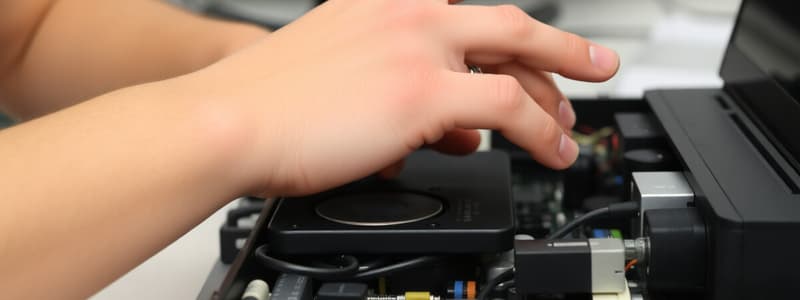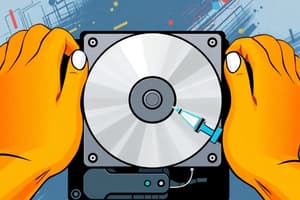Podcast
Questions and Answers
What is the first step you should take before cleaning your computer equipment?
What is the first step you should take before cleaning your computer equipment?
- Disconnect all peripherals
- Use a cleaning agent
- Power down and disconnect the device (correct)
- Remove the dust cover
Why is it important to avoid exposing your computer to excessive dust?
Why is it important to avoid exposing your computer to excessive dust?
- It can interfere with the functionality of the circuitry (correct)
- It can cause the outside casing to rust
- It may lead to a hardware warranty void
- It changes the color of the components
What should you do with USB drives or DVDs that have been previously used on outside computers?
What should you do with USB drives or DVDs that have been previously used on outside computers?
- Avoid them as they may contain viruses (correct)
- Store them in a separate drawer
- Use them only if they are wiped clean
- Solely use them if they are from a trusted source
What is a recommended method to clean a mouse and keyboard?
What is a recommended method to clean a mouse and keyboard?
What could happen if you were to pile objects on top of your computer keyboard?
What could happen if you were to pile objects on top of your computer keyboard?
Which action is strongly discouraged in a computer lab to prevent hazards?
Which action is strongly discouraged in a computer lab to prevent hazards?
Why should you not install software without your teacher's permission?
Why should you not install software without your teacher's permission?
What should be ensured before printing documents?
What should be ensured before printing documents?
What is the recommended method for cleaning a computer monitor?
What is the recommended method for cleaning a computer monitor?
What should you avoid using on your monitor to prevent damage?
What should you avoid using on your monitor to prevent damage?
What is a safe practice for organizing cords and cables?
What is a safe practice for organizing cords and cables?
How should one manage laptop battery charging to prolong its lifespan?
How should one manage laptop battery charging to prolong its lifespan?
What could obstruct airflow around a computer and lead to overheating?
What could obstruct airflow around a computer and lead to overheating?
What is the correct procedure to shut down a computer?
What is the correct procedure to shut down a computer?
What environmental practice should be followed regarding printing?
What environmental practice should be followed regarding printing?
What is the recommended action when disposing of electronic devices?
What is the recommended action when disposing of electronic devices?
What should be avoided to protect digital devices from damage?
What should be avoided to protect digital devices from damage?
Flashcards are hidden until you start studying
Study Notes
Computer Care & Maintenance
- Power Down & Disconnect Devices before Cleaning: Always power down and disconnect devices before cleaning to prevent damage.
- Proper Shutdown: Utilize the on-screen procedure for shutting down your computer instead of directly using the power button.
- Dust Prevention: Cover your computer with a dust cover when not in use to minimize dust accumulation, which can affect circuitry.
Using Storage Devices
- Avoid External USB Drives, CDs & DVDs: These devices can carry viruses that may harm your computer.
- Virus Definition: A virus is a piece of software that can cause computer malfunctions.
General Computer Usage Practices
- Keyboard Protection: Do not place objects on top of the keyboard as their weight can damage the keys.
- Moving Computers: Do not move a computer while it is switched on and operational.
- Food & Drink Precautions: Refrain from eating or drinking in the computer lab as liquid spills can cause short circuits and food crumbs can lead to malfunctions.
- Software Installation: Do not install software without your teacher's permission.
- Printing Wisely: Print only what is truly necessary, as paper and printer cartridges are expensive.
Cleaning Peripherals
- Mouse & Keyboard Cleaning: Wipe down with a lint-free damp cloth. Use a can of compressed air to remove dust particles. Avoid using chemicals or cleaning agents.
- Monitor Cleaning: Utilize a soft, dry, lint-free microfiber cloth or a slightly dampened one, ensuring it's wrung out thoroughly.
- Avoid Abrasives: Never use alcohol, ammonia based cleaners, or paper towels on the monitor screen as they can damage the anti-reflective coating.
- Screen Cleaning Precautions: Do not spray water directly onto the screen to avoid potential damage to internal components.
- Printers, Scanners, Projectors & Peripherals: Clean with a soft, dry, lint-free microfiber cloth or a slightly dampened one, wrung out thoroughly.
Cord and Cable Management
- Cable Organization: Use cable ties to keep cords and cables organized to prevent damage from twisting or tugging, improve aesthetics, and minimize safety hazards.
- Avoid Overloading Outlets: Do not overload power outlets or power strips with too many devices to prevent fire hazards.
Battery Care
- Avoid Overcharging: Do not leave laptop batteries plugged in all the time to prevent reduced lifespan and battery damage.
- Optimal Battery Charging: Wait until your laptop reaches a 20% charge before plugging it in for a full recharge.
Air Flow & Overheating
- Keeping Vents Clear: Ensure computer vents are free from obstructions to facilitate proper airflow and prevent overheating.
- Laptops and Airflow: Avoid placing laptops on soft surfaces like beds or laps as this restricts airflow.
Shutting Down Your Computer
- Correct Shutdown: Shut down your computer properly each night to save energy and allow Microsoft updates to install on Windows computers.
- Avoid Cold Booting: Do not hold down the power button to shut down your computer as this can damage hardware and software.
Environmental Responsibility
- Reduce Printing: Only print information when absolutely necessary to minimize paper waste.
- Conserve Energy: Turn off devices when not in use to reduce electricity consumption.
- Proper Electronic Waste Disposal: Dispose of computers and electronic devices at designated recycling centers for safe extraction of hazardous materials.
Studying That Suits You
Use AI to generate personalized quizzes and flashcards to suit your learning preferences.




